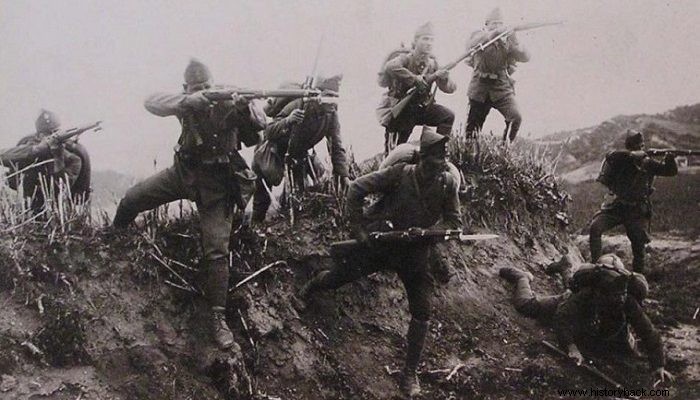
In May 1919, Greek troops landed in Smyrna. It was there that the first clashes with armed Turks took place in a foretaste of what was to come. Gradually the situation calmed down and the Greek forces expanded their zone of control.
Pergamos, the Greek ancient city is located 90 km north of Smyrna. The Greek administration decided to place it under Greek control, and on May 30 the 1/8th Cretan Battalion entered the city, reinforced with three machine-gun platoons, a ulama of mountain artillery and a hemilarchy of about 60 horsemen.
Ulamas of the battalion were advanced as far as Dikeli, the port of Pergamum from where the detachment would be supplied. But the Turks reacted immediately. At first the governor of the city protested against the Greek "occupation", because, as he argued, Pergamos was outside the territories that had been awarded to Greece.
The Greek force, however, ignored him and the chief lieutenant colonel Syrmakezis deployed his men defensively on the heights around the city and on the bridge over the Caicos river where the road connecting Pergamum with Smyrna passed.
Sirmakezis deployed his two and a half companies, the machine gun platoons, the artillery in the area of the city. On June 2, however, the Greek forces were attacked from all directions by strong regular and irregular Turkish forces under Captain Omar Kemal Bey. The Turks also attacked the transport detachment of the battalion that was moving to Dikeli to transport supplies and the guard of the bridge.
The Turks slaughtered the ferrymen and the bridge guard and overwhelmed the defenders at Pergamum. The Greek battalion fought until the afternoon. Being pressed, the Greeks lost their main defensive support, the hill of old Pergamum.
After that, Syrmakezis decided that there was no other solution but to retreat. The detachment would retreat under cover of night. Indeed, the retreating maneuver started at 21.00 but due to noise caused by Greek soldiers, the Turks realized what was happening and attacked.
Panic ensued. Almost all the material was abandoned and the men of the detachment retreated in disarray, arriving the next evening at Menemeni, at a distance of 80 km from Pergamum. Losses were heavy. The detachment had 10 dead, nine wounded, but also 86 "disappeared". The "disappeared" in question were the most unfortunate since they fell alive into the hands of the barbaric Turks.
On June 7, after a fierce battle, the Greek forces returned to Pergamum where they witnessed scenes of absolute horror seeing their "disappeared" colleagues dead with their bellies open, their genitals cut off and placed in their mouths, or horseshoes nailed to the feet…
It was obvious that the Asia Minor adventure of Hellenism did not begin pleasantly and that the enemy was fanatical and determined. A new tactical and strategic approach would be required to deal with the Turkish threat... However, the Tagus at the time did not dare to take the harsh but necessary measures of "persuasion" of the barbarians.
